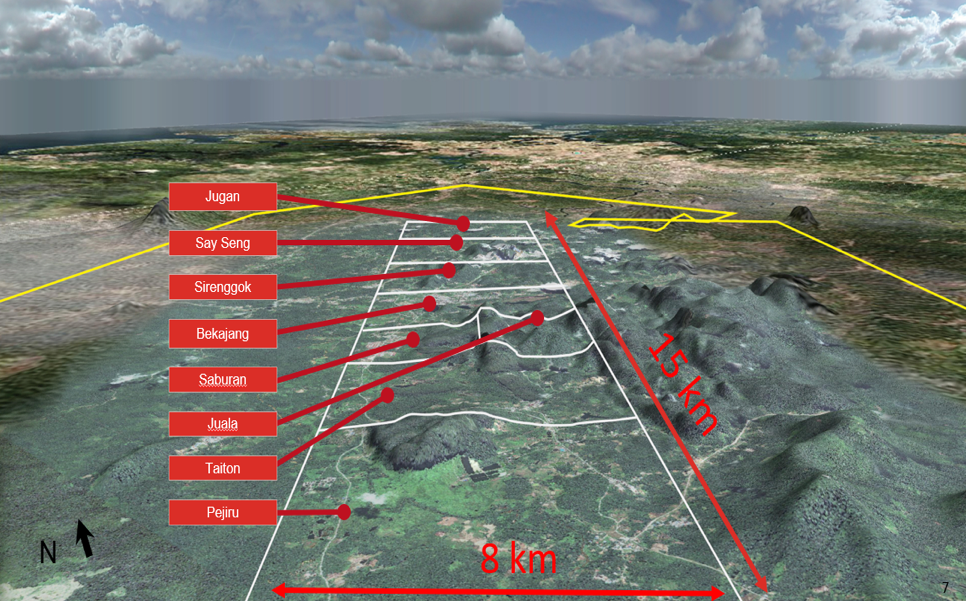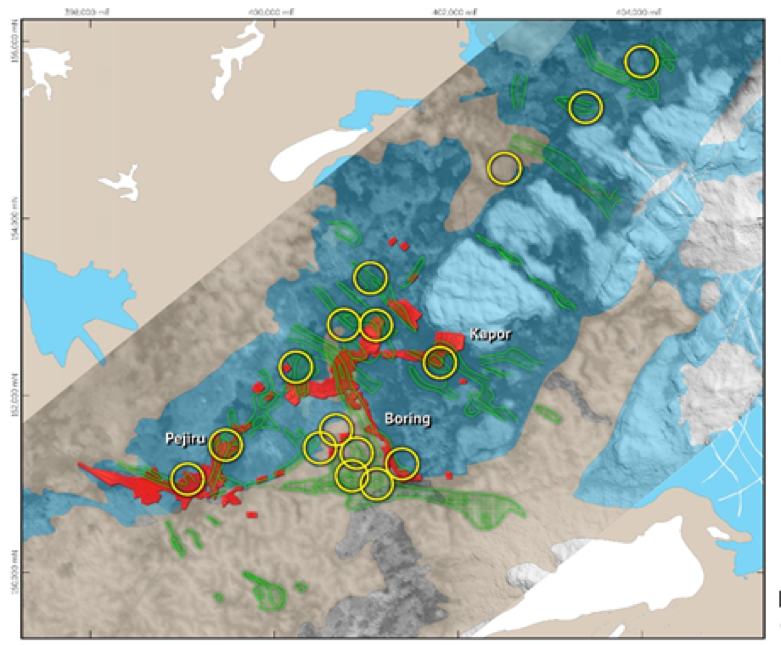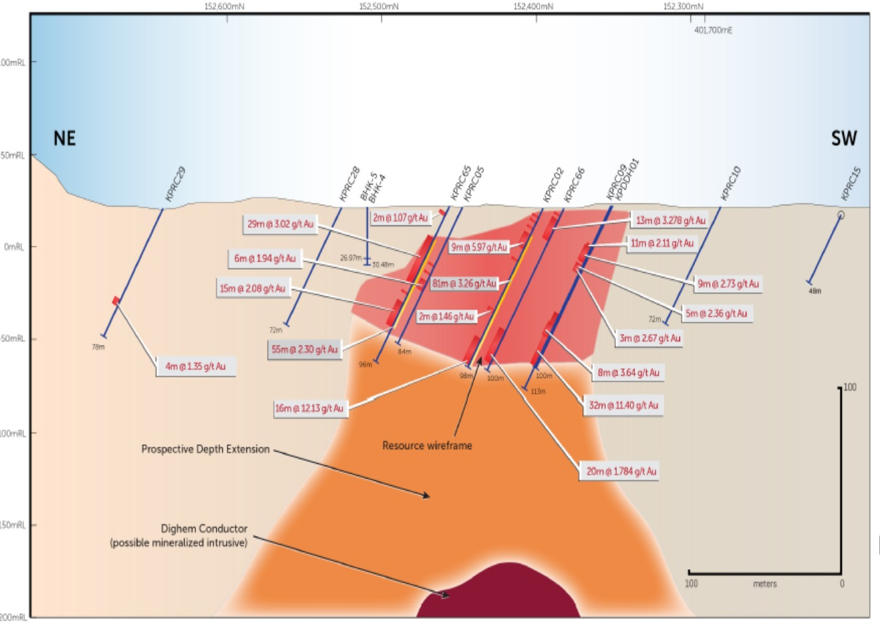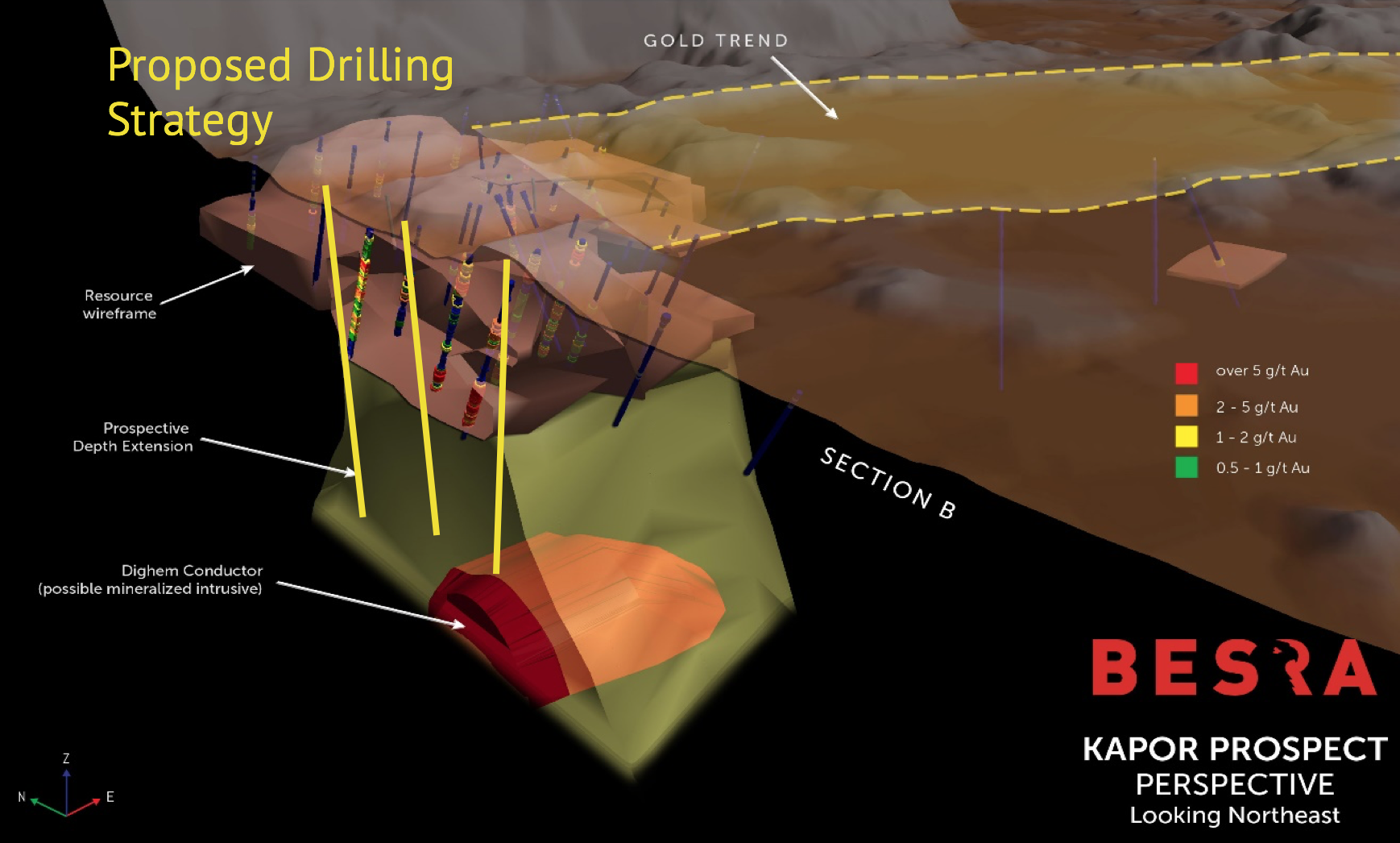14 October 2021
DRILLING PROGRAM TO TARGET SIGNIFICANT EXTENSION OPPORTUNITY AT PEJIRU
Highlights:
- Besra has designed a drilling program targeting extensions to the Pejiru Gold Deposit within the wider Bau Project, which already hosts:
- An initial drilling program at Pejiru of circa 3,000 metres is planned to commence in the next 2-4 weeks to test the depth extent where previous drillholes terminated within high-grade mineralisation
- Previous drilling intercepts to be followed up included:
- KPDDH01 – 32 m @ 11.4 g/t;
- KPRC 65 – 55m @ 2.3 g/t;
- KPRC02 – 81 m @ 3.26 g/t, including 11 m @ 12.13 g/t; and
- KPRC 66 – 20 m @ 1.8 g/t.
Besra Gold Inc (Besra or the Company) is pleased to announce the imminent commencement of a key part of its initial drilling within the Pejiru Sector, aimed at both upgrading the classification and increasing the overall Resource inventory, to support future potential development feasibility studies.
The Pejiru Deposit is already a significant part of the wider Bau Gold Project (73.6 Mt @ 1.43 g/t for 3.3Moz of gold) hosting:
A detailed review by Besra has outlined a 3,000m drilling program targeting two distinct mineralisation habitats identified being near surface deposits and sub-vertical feeder zones.
[1] The Pejiru Exploration Target ranges between 1.7 – 3.3 million Oz based on a range of grades of 1.76 – 2.44 Au g/t
[2] The potential quantity and grade of the Exploration Targets is conceptual in nature; there has been insufficient exploration to estimate a Mineral Resource and it is uncertain if further exploration work will result in the estimation of a Mineral Resource.
[3] The Pejiru Exploration Target ranges between 1.7 – 3.3 million Oz based on a range of grades of 1.76 – 2.44 Au g/t
[4] The potential quantity and grade of the Exploration Targets is conceptual in nature; there has been insufficient exploration to estimate a Mineral Resource and it is uncertain if further exploration work will result in the estimation of a Mineral Resource.
Figure 1 – Location of the Pejiru Sector (bottom of image) on an oblique NE trending view of the Bau Gold Field corridor, with Sarawak’s capital Kuching in the distance.
Within the Bogag-Pejiru area of the Pejiru Sector the Resource wireframe extends for a strike length of 1.5 km and is between 100 -150 m wide. Given the limited drilling density, and as reflected in the current Inferred Resource classification, the extent of mineralisation remains open at several locations both in the dip and strike directions. Proposed targeted infill and step-out drilling is intended to better define the extent of mineralisation as well as allow upgrading of the Resource classification to enable their support in future feasibility studies.
Figure 2 – Footprint of the Resource wireframe (in red) superimposed onto a geological image of the Pejiru Sector. Bau Limestone outcrop is shown in blue and Pedawan Shale outcrop in brown. The strong angularity of the existing wireframe footprint highlights the control of fault lineations on the distribution of mineralisation within the Pejiru Sector.
Comprehensive geophysical coverage, correlated to historical drill results and surface mapping, has resulted in the identification of 16 potential sub-vertical feeder systems within the Pejiru Sector (Figure 3).
Figure 3 – Location of interpreted sub-vertical feeder systems (yellow circles) in relation to the Pejiru Resource wireframe (red), and other geophysical resistivity anomalies (green) overlain onto a false colour scale geological map of the Pejiru Sector. Blue coloured areas are dominated by outcropping Bau Limestone, and grey coloured areas Pedawan Shale.
Priority drilling will be undertaken on those known to be associated with shallow mineralisation and having coincident DIGHEM conductivity anomalies – given that these anomalies suggest the involvement of underlying intrusives and the potential for mineralized deep lead shoots within the former sub-vertical feeder zones. The Bau conceptual model suggests that with increasing depth these sub-vertical feeder zones, would generally exhibit progressively more siliceous and higher-grade mineralisation characteristics.
Figure 4, illustrates the attributes of such targets on a cross-section of the Kapor Prospect. Here historical drilling, targeting shallow mineralisation within the Bau Limestone, encountered anomalously higher-grade gold intersections across a surface footprint having a distinct DIGHEM conductivity anomaly. The more remarkable intersections included:
KPDDH01 – 32 m @ 11.4 g/t;
KPRC 65 – 55m @ 2.3 g/t;
KPRC 66 – 20 m @ 1.8 g/t; &
KPRC02 – 81 m @ 3.26 g/t, including 11 m @ 12.13 g/t.
Figure 4 – Cross-section through the Kapor Prospect showing historic shallow drilling intersections, together with a schematic representation of an interpreted possible mineralized intrusive, based on the occurrence of a DIGHEM conductor anomaly.
Besra intends to undertake additional drilling specifically to determine the depth extent of these deeper higher grades of mineralisation at Kapor Prospect located within the Pejiru Sector (Figure 5).
Figure 5 illustrates the intentions of Besra’s proposed future drilling at Kapor. Drill holes will provide additional infill control of historical drilling at the shallow levels (typically 70m) but extend at depth to investigate the potential for mineralized deep lead shoots within the former sub-vertical feeder systems, associated with an interpreted underlying intrusive.
Figure 5 – Cut-away of a perspective block diagram of the Kapor Prospect showing shallow historical drill hole locations and nominal positions for proposed deeper drilling to investigate sub-vertical feeder associated mineralisation potential
Although the surface footprint of the DIGHEM geophysical anomaly footprint is restricted, by their very nature the bulk of the mineralisation is expected to have a dominant vertical component (in contrast to the shallow mineralisation associated with limestone/shale contacts). Mineralisation in these settings is likened to that encountered at the Tai Parit mine site, located just outside of the township of Bau. Tai Parit, which ceased operations in 1996 following a downturn in commodity prices, had produced a total of 1.2 Moz of largely non- refractory Au, with average grades during the most recent production of 7 g/t. Total production was from an open pit extending some 80 m subsurface, with the pit floor still within mineralisation. At Kapor several infill holes will be drilled to 120 – 150 m to ascertain the extent of deeper mineralisation. Similar features at Boring will also be investigated as part of the Pejiru Drilling Program.
This announcement was authorised for release by the Board of Besra Gold Inc.
Ray Shaw
Chief Executive Officer
Competent Person’s Statement
The information in this Announcement that relates to Exploration Results, Mineral Resources or Ore Reserves is based on information compiled by Mr. Kevin J. Wright, a Competent Person who is a Fellow of the Institute of Materials, Minerals and Mining (FIMM), a Chartered Engineer (C.Eng), and a Chartered Environmentalist (C.Env). Mr. Wright is a consultant to Besra. Mr. Wright has sufficient experience which is relevant to the style of mineralisation and type of deposit under consideration and to the activity which he is undertaking to qualify as a Competent Person as defined in the JORC Code (2012 Edition) of the Australasian Code for Reporting of Exploration Results, and a Qualified Person as defined in National Instrument 43-101 Standards of Disclosure for Mineral Projects of the Canadian Securities Administrators.
Kevin J. Wright consents to the inclusion in this Announcement of the matters based on his information in the form and context that it appears.
Disclaimer
This Announcement contains certain forward-looking statements and forecasts concerning future activities, including potential delineation of resources. Such statements are not a guarantee of future performance and involve unknown risks and uncertainties, as well as other factors which are beyond the control of Besra Gold Inc. Actual results and developments may differ materially from those expressed or implied by these forward-looking statements depending upon a variety of factors. Nothing in this Announcement should be construed as either an offer to sell or a solicitation of an offer to buy or sell securities.
Unless otherwise indicated, all mineral resource estimates and Exploration Targets included or incorporated by reference in this Announcement have been, and will be, prepared in accordance with the JORC classification system of the Australasian Institute of Mining and Metallurgy and Australian Institute of Geoscientists.
Disclosure
The Pejiru Sector lies within MC/KD/01/1994 which has been pending renewal for a number of years. As outlined in the Malaysian Solicitor’s Report on Title (Attachment G) of the Replacement Prospectus of Besra dated 8 July 2021, until a decision is made, the intention of section 48(9) of the Minerals Ordinance is to enable mining activities to continue on a pre- existing licence, in those prior lands of MC/KD/01/1994, until a determination of the renewal is made.
The information in this announcement is based on the following publicly available announcements previously lodged on the SEDAR platform which are available on https://www.sedar.com>Display Company Documents or on Besra’s website.
1 Besra Gold Inc Bau Gold Project Sarawak Malaysia Exploration Target Inventory. Lodged SEDAR Platform Feb 26, 2021.
2 Besra Bau Project – Mineral Resource and Ore Reserve Updated to JORC 2012 Compliance. Lodged SEDAR Platform Nov 22, 2018.




